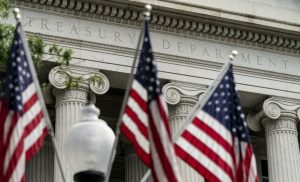The U.S. Department of the Treasury’s Financial Crimes Enforcement Network (FinCEN) announced that it has extended the effective dates of orders issued on June 25, 2025, targeting three Mexico-based financial institutions accused of facilitating money laundering linked to illicit opioid trafficking.
Financial institutions subject to the orders will now have until September 4, 2025, an additional 45 days, to comply with prohibitions on specific transmittals of funds involving CIBanco S.A., Intercam Banco S.A., and Vector Casa de Bolsa S.A. de C.V.
The institutions were previously designated as “primary money laundering concerns” under the Fentanyl Sanctions Act and FEND Off Fentanyl Act, as part of a broader U.S. effort to disrupt the financial networks of transnational criminal organizations involved in the trafficking of synthetic opioids.
“For months, Treasury and the Government of Mexico have been jointly coordinating to safeguard our financial institutions from terrorist cartels and their money laundering operations,” said FinCEN Director Andrea Gacki, calling the initial orders “historic.”
According to FinCEN, the Mexican government has taken additional steps to address the concerns raised, including temporarily assuming management of the institutions to improve regulatory oversight and combat illicit finance. Treasury officials stated they will continue working closely with Mexican counterparts and will assess future developments before deciding on any further extensions.
Last month, the treasury formally identified three Mexico-based financial institutions as primary money laundering concerns linked to fentanyl trafficking. The institutions, CIBanco S.A., Intercam Banco S.A., and Vector Casa de Bolsa, S.A. de C.V., have been implicated in facilitating illicit financial transactions on behalf of Mexico-based cartels.
The orders, issued under the authorities granted by the Fentanyl Sanctions Act and the FEND Off Fentanyl Act, mark FinCEN’s first such actions targeting money laundering tied to synthetic opioids. These actions prohibit U.S. financial institutions from transmitting funds to or from the named entities, including related accounts and cryptocurrency wallets. The restrictions will take effect 21 days after publication in the Federal Register.
According to FinCEN, CIBanco and Intercam, commercial banks with assets exceeding $7 billion and $4 billion respectively—and Vector, a brokerage firm managing nearly $11 billion, have played a long-standing role in laundering millions of dollars for cartels. These activities include processing payments for precursor chemicals sourced from China, used in the production of fentanyl and other synthetic opioids.
“Financial facilitators like CIBanco, Intercam, and Vector are enabling the poisoning of countless Americans by moving money on behalf of cartels,” said Treasury Secretary Scott Bessent. “Today’s actions affirm our commitment to using every tool available to disrupt these networks.”
CIBanco was found to have processed over $2.1 million in transactions between 2021 and 2024 involving Mexican firms and China-based suppliers of precursor chemicals. In 2023, a CIBanco employee knowingly created an account to help launder $10 million for a Gulf Cartel associate. The bank is also linked to transactions with the Beltrán-Leyva and Jalisco New Generation (CJNG) cartels.
Intercam executives allegedly met with CJNG members in 2022 to discuss laundering operations. From 2021 to 2024, a China-based supplier linked to fentanyl production received over $1.5 million through Intercam transactions involving Mexican companies.
Vector facilitated over $1 million in chemical procurement payments from 2018 to 2023 and allegedly helped a Sinaloa Cartel money mule move $2 million from the U.S. to Mexico from 2013 to 2021. The findings point to serious gaps in Vector’s anti-money laundering and counter-terrorism financing protocols.
These actions align with broader U.S. efforts to combat cartel operations. In January 2025, President Donald Trump signed an Executive Order enabling the designation of drug cartels as Foreign Terrorist Organizations (FTOs) and Specially Designated Global Terrorists (SDGTs). In February, eight groups—including CJNG, the Gulf Cartel, and the Sinaloa Cartel, were formally designated under the new authorities.
FinCEN emphasized that these orders were issued in cooperation with Mexico and in support of both countries’ commitments to robust anti-money laundering regimes and cross-border coordination.



